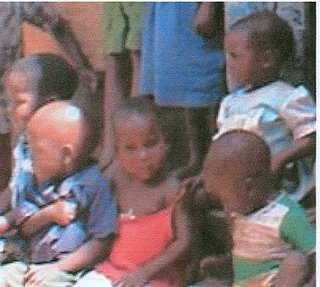
When Marriage Kills
March 30th, 2005
In the last issue I shared with you some things about life and death matters. This issue is a continuation of NICHOLAS D. KRISTOF's focus on the appalling human conditions as he travels Africa. It is astounding to hear that “at present infection rates in Zimbabwe, 85 percent of today's 15-year-olds will die of AIDS.”
Needless to say these are difficult issues to deal with, not only the magnitude, but as a starter to speak so boldly as Kristof addresses the reality of sex in the article herewith. If we can’t deal with the root cause of AIDS orphaned children – we’ll have a never-ending battle to save the orphaned kids. To learn more about the AIDS orphaned children ZOE Ministry helps go to http://www.zoeministry.org/.
What’s Your Opinion?
zzzzzzzzzzzzzzzzzzzzzzzzzzzzzzzzzzzzzzzzzzzzzzzz
Excerpt from today’s article:
"The irony is that President Bush's plan to tackle AIDS in Africa - spending far more than any previous administration - could be one of his best and most important legacies. It tackles one of the most important humanitarian challenges in the world today: at present infection rates in Zimbabwe, 85 percent of today's 15-year-olds will die of AIDS."
Kero Sibanda's husband died two years ago, apparently of AIDS. Now Mrs. Sibanda worries that she and her beautiful 2-year-old daughter, Amanda, have H.I.V. as well.
http://www.nytimes.com/2005/03/30/opinion/30kristof.html?th=&emc=th&pagewanted=print&position=
March 30, 2005
NY Times OP-ED COLUMNIST
When Marriage Kills
By NICHOLAS D. KRISTOF
Livingstone, Zambia — Sex kills all the time, particularly here in Africa. But prudishness can be just as lethal.
President Bush is focusing his program against AIDS in Africa on sexual abstinence and marital fidelity, relegating condoms to a distant third. It's the kind of well-meaning policy that bubbles up out of a White House prayer meeting but that will mean a lot of unnecessary deaths on the ground in Africa.
The stark reality is that what kills young women here is often not promiscuity, but marriage. Indeed, just about the deadliest thing a woman in southern Africa can do is get married.
Take Kero Sibanda, a woman I met in a village in Zimbabwe. Mrs. Sibanda is an educated woman and lovely English-speaker who married a man who could find a job only in another city. She suspected that he had a girlfriend there, but he would return to the village every couple of months to visit her.
"I asked him to use a condom," she said, "but he refused. There was nothing I could do."
He died two years ago, apparently of AIDS. Now Mrs. Sibanda worries that she and her beautiful 2-year-old daughter, Amanda, have H.I.V. as well.
Encouraging more use of male and female condoms might reduce such tragedies, for there's a disdain for condoms in many countries that social marketing might change (there's an African saying: "Who wants a sweet with the wrapper still on?").
The fact is that condoms have played a crucial role in the campaigns against AIDS that have been relatively successful, from Thailand's "100 percent condom program" to the efforts in Uganda, Cambodia and Senegal. And condoms don't cause sex any more than umbrellas cause rain.
In theory, everybody agrees on how to prevent AIDS: the ABC method, which stands for abstinence, being faithful and condoms. But the Bush administration interprets this as ABc. New administration guidelines stipulate that U.S.-financed AIDS programs for young people must focus on abstinence or, for those who are already sexually active, "returning to abstinence."
Here in Livingstone, Zambia, I visited Corridors of Hope, a U.S.-financed center for young people that has proved cheap and effective in reducing H.I.V. among prostitutes and long-distance truck drivers. One prostitute in the program is Mavis Sitwala, an orphan (probably because of AIDS) who is supporting her five siblings and one child. She says that truck drivers pay $1 for sex with a condom or $4 for sex without.
"At times, you need food or money to pay the rent," she said, "and so even if he won't use a condom, you agree."
Encouraging Ms. Sitwala to "return to abstinence" isn't likely to get far, but encouraging more use of condoms might save her life, the lives of her clients and the lives of her clients' wives. Indeed, the Bush administration recognizes that, allowing condoms to be handed out to prostitutes in programs like Corridors of Hope - but not to society as a whole.
There's a bit of wiggle room in the administration guidelines. But the U.S. Center for Health and Gender Equity reports that in several countries, the U.S. is already backing away from effective programs that involve condoms.
The irony is that President Bush's plan to tackle AIDS in Africa - spending far more than any previous administration - could be one of his best and most important legacies. It tackles one of the most important humanitarian challenges in the world today: at present infection rates in Zimbabwe, 85 percent of today's 15-year-olds will die of AIDS.
So I wish Mr. Bush would reach out beyond the ideologues to a real expert, like Loveness Sibanda. I met Mrs. Sibanda (no relation to the other Mrs. Sibanda) and her child in her village in Zimbabwe. She is 26, and her husband works in the city of Bulawayo, where she has heard that he has a girlfriend. Every few months he comes back to the village and insists on sleeping with her, without a condom. She now dreads these visits.
Perhaps the White House thinks it has the moral high ground when it preaches, completely irrelevantly, to women like Mrs. Sibanda about the need to be faithful. But it strikes me as hypocritical to pontificate about virtue while pursuing an ideological squeamishness about condoms that risks condemning Mrs. Sibanda and millions like her to die of AIDS.
E-mail: nicholas@nytimes.com
No comments:
Post a Comment